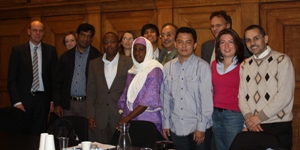“Keep it simple” is one of Roy Bahl’s rules for fiscal decentralisation that Jamie Boex, public finance expert, kept repeating during the training course “Fiscal Decentralisation and Local Finances”. This course, organised in cooperation with the Urban Institute in Washington, took place from 7 up to 11 November 2011. A diverse group of participants from ten different countries around the world gathered in The Hague to participate in this training course in order to increase their knowledge, to share experiences and to gain new insights in the course topic.
During the training course week, different topics were covered by various experts from the Urban Institute, the Maastricht Graduate School of Governance, the Municipalities of Amsterdam and The Hague, the Dutch Ministry of Interior and the Dutch Ministry of Finance.
After a brief introduction of basic concepts and practices of political, administrative and financial decentralisation, the course focused on the four pillars of fiscal decentralisation: expenditure assignment, local revenues, intergovernmental fiscal transfers and borrowing. Also tools and mechanisms for accountability were discussed as well as theory and practice of the implementation of fiscal decentralisation. The diversity of the group added major value to the training course, as the group consisted of (fiscal) professionals from Ecuador, Kenya, Nigeria, Philippines, Palestine, Bangladesh, The Netherlands, Indonesia, India and Albania. There was an open environment in which lots of experiences and cases were shared.
It was an intense week, the participants were engaged and focused, but with an open and pleasant atmosphere. As one of the participants said: “This course provided a wonderful platform for learning many things about fiscal decentralisation and at the same time exchange knowledge and experiences with other participants coming from different countries around the world”.

